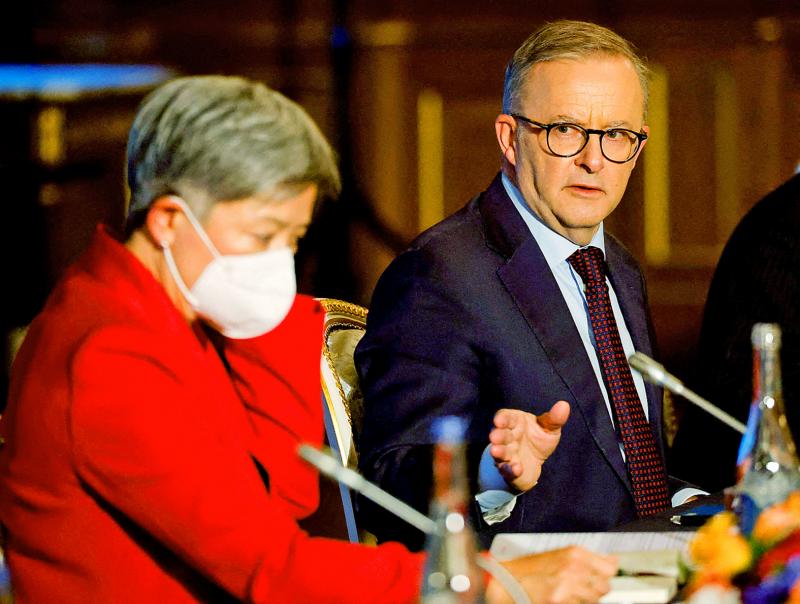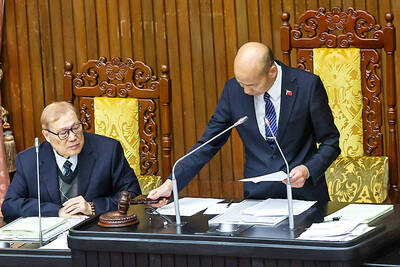Newly elected Australian Prime Minister Anthony Albanese said Pacific leaders have been “very positive” about his government’s renewed engagement, even as Beijing continues its diplomatic blitz across the increasingly contested region.
The comments from Albanese — aired yesterday in an interview with Sky News — came as Chinese Minister of Foreign Affairs Wang Yi (王毅) visited Fiji for closely watched meetings with the island nation’s leaders and other Pacific foreign ministers.
Wang, who began his South Pacific tour on Thursday in the Solomon Islands, is expected to discuss with his fellow foreign ministers a wide-ranging draft agreement and five-year plan, which was leaked last week.

Photo: Reuters
The leaked drafts, obtained by Agence France-Presse, were circulated to at least 10 Pacific nations ahead of the Fiji meeting, sparking concern about Beijing’s ambitions to dramatically expand security and economic cooperation within the South Pacific.
Albanese was scathing in his assessment of the former Australian government’s Pacific plan, saying that it had “dropped the ball” in the region — blaming foreign aid cuts and “a nonengagement on values.”
“For our Pacific island neighbors, the issue of climate change is an absolute national security issue,” he said.
In addition to increased action on the environment, Albanese touted a boost in aid and a plan to set up a defense training school in the Pacific.
During Australia’s election campaign, Albanese’s centre-left Labor Party said the school would involve forces from Papua New Guinea, Fiji, Tonga, East Timor, Vanuatu and the Solomon Islands.
Albanese said Australia’s renewed diplomatic push in the Pacific, which began with a visit to Fiji by Australian Minister of Foreign Affairs Penny Wong (黃英賢) had been well-received.
“The response has been very positive,” he said.
Australia and China have been locked in a tense duel for influence in the Pacific, after Beijing last month surprised Canberra by securing a wide-ranging security pact with the Solomon Islands.
Wang is expected to remain in Fiji’s capital until at least tomorrow, meeting with the country’s leaders and hosting the second China-Pacific Island Countries Foreign Ministers’ meeting.
Wang met yesterday with Pacific Islands Forum Secretary-General Henry Puna, who said economic recovery from the COVID-19 pandemic and “urgent and ambitious climate change action” were key issues for their discussion.
“We welcome China’s climate change commitments,” Puna said.
Wang is expected to visit Tonga, Vanuatu and Papua New Guinea to round out his tour.

DEFENDING DEMOCRACY: Taiwan shares the same values as those that fought in WWII, and nations must unite to halt the expansion of a new authoritarian bloc, Lai said The government yesterday held a commemoration ceremony for Victory in Europe (V-E) Day, joining the rest of the world for the first time to mark the anniversary of the end of World War II in Europe. Taiwan honoring V-E Day signifies “our growing connections with the international community,” President William Lai (賴清德) said at a reception in Taipei on the 80th anniversary of V-E Day. One of the major lessons of World War II is that “authoritarianism and aggression lead only to slaughter, tragedy and greater inequality,” Lai said. Even more importantly, the war also taught people that “those who cherish peace cannot

STEADFAST FRIEND: The bills encourage increased Taiwan-US engagement and address China’s distortion of UN Resolution 2758 to isolate Taiwan internationally The Presidential Office yesterday thanked the US House of Representatives for unanimously passing two Taiwan-related bills highlighting its solid support for Taiwan’s democracy and global participation, and for deepening bilateral relations. One of the bills, the Taiwan Assurance Implementation Act, requires the US Department of State to periodically review its guidelines for engagement with Taiwan, and report to the US Congress on the guidelines and plans to lift self-imposed limitations on US-Taiwan engagement. The other bill is the Taiwan International Solidarity Act, which clarifies that UN Resolution 2758 does not address the issue of the representation of Taiwan or its people in

The Philippines yesterday criticized a “high-risk” maneuver by a Chinese vessel near the disputed Scarborough Shoal (Huangyan Island, 黃岩島) in a rare incident involving warships from the two navies. The Scarborough Shoal — a triangular chain of reefs and rocks in the contested South China Sea — has been a flash point between the countries since China seized it from the Philippines in 2012. Taiwan also claims the shoal. Monday’s encounter took place approximately 11.8 nautical miles (22km) southeast” of the Scarborough Shoal, the Philippine military said, during ongoing US-Philippine military exercises that Beijing has criticized as destabilizing. “The Chinese frigate BN 554 was

LEISURE: The new law adds Confucius’ birthday, the anniversary of the Battle of Guningtou, Constitution Day and Little New Year as national holidays The Legislative Yuan yesterday passed new legislation adding four national holidays and making Workers’ Day a national holiday for all sectors. The Chinese Nationalist Party (KMT) and the Taiwan People’s Party used their combined majority in the legislature to push the jointly proposed draft through its third and final reading. This new law supersedes the existing regulations for the implementation of memorial days and state holidays, which are administered by the Ministry of the Interior. The new law recognizes Confucius’ birthday on Sept. 28, the anniversary of the Battle of Guningtou on Oct. 25, Constitution Day on Dec. 25 and “Little New Year,”